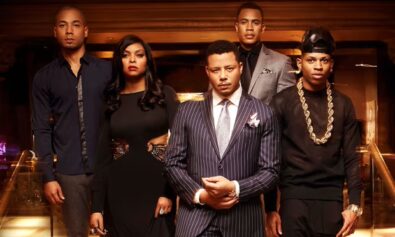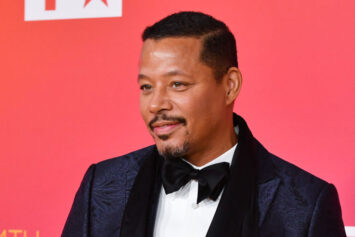Terrence Howard, who played Lucious Lyon on the hit show “Empire,” is embroiled in a legal battle with his former talent agency, CAA. He recently went into more details about the suit during an interview on March 30 on the podcast Straight Talk with Daphne Phaneē. While we won’t talk about the pimp wig and ’70s suit the Oscar-nominated actor wore for the sitdown, here is more information about why he’s suing.

The Alleged Pay Disparity
Howard alleges CAA lowballed him on his salary for “Empire” while securing much higher pay for actors on shows with lower viewership.
He claims he earned $325,000 per episode at his peak on “Empire.”
He portrayed hip-hop music mogul Lucious Lyon on six seasons of the Fox drama. The show aired from 2015 to 2020.
In comparison, he points to actors on “Big Bang Theory” who were paid “$2 million, damn near $3 million an episode.” The actor claims they only explanation is that the cast on “Big Bang Theory” were “white kids.”
“[CAA] represented me, they also represented some of the people from ‘Big Bang Theory,‘” he said in the interview. “[CAA] also did the deal with Fox, my show was with Fox, the people on ‘Big Bang Theory’ was with Fox.”
He continued, “We had 28 million viewers, [‘Big Bang’] had 11 million viewers. [The ‘Big Bang’ cast] was getting $2 million, damn near $3 million an episode. Those white kids, they had no name recognition, no Oscar nominations, none of that,” he added.
“We have 28 million viewers and these jokers are paying me $325,000 an episode,” he said. “Every year I’m asking my agents what’s going on, what’s going on. I didn’t know that [with] the packaging deal, my agents were incentivized to keep my pay low. They owe me over $120 million based on what would’ve been paid to white counterparts.”
Howard it seems might be exaggerating–but there’s not mistake it was a successful show.
“Empire” started its first season averaging 17.33 million viewers, and the second averaged 15.73 million, according to Forbes. Empire had 9.9 million viewers for its first episode at the beginning of January 2015. And, according to Guardian, “it also had a higher rating in the coveted 18-to-49 demographic than its lead-in, the former juggernaut ‘American Idol.'” Episodes following that month saw an uptick with 11.5 million and then 11.96 million. At the time, the Guardian said it as one of the top shows on TV that season.
For that same year (2015), “Big Bang Theory,” which ran from 2007 to 2019, ” had an average viewership of 20. million people, according to Statista.
Although Howard doesn’t say when exactly “Empire” had ratings of 28 million, the math doesn’t seem to be mathing in Howard’s favor.
The Lawsuit
Howard is suing CAA for breach of fiduciary duty and fraud. He claims CAA had a conflict of interest due to representing both him and “Empire” creators/production companies. It also says CAA failed to negotiate a fair deal based on his accomplishments and the show’s success, and that the agency misrepresented industry standards during negotiations, The Daily Beast reported.
The lawsuit seeks over $120 million in compensation for what Howard believes he is owed.
“When I asked them about it, about my money, they sent me a check for $666 exactly, not saying where it’s from. So I was like, oh, y’all tryna threaten me,” he said. “This is a threat right here and y’all think I’m scared? You think I’m gonna be quiet about this? Because I wonder what y’all are doing to every other Black artist.”
The Underlying Issue
While Howard can’t definitively claim racism, he raises a the question: Were white actors on comparable shows receiving significantly higher pay?
“I can’t say for certain this was a racial issue, but I can’t imagine another counterpart – a white counterpart – with the same accolades, name recognition and numbers that I had, receiving the lowball pay that I was receiving,” Howard told Rolling Stone.
Howard, who came out of retirement to deal with an outstanding tax debt if nearly $1 million, says he thinks there will be repercussions to his lawsuit.
“They’re like, ‘Oh, don’t you want to work in the business?’ And I’m like, no, I want my money so I don’t have to work,” he said. “That’s the whole point of working. I wanted to retire so I can do what I gotta do.”




